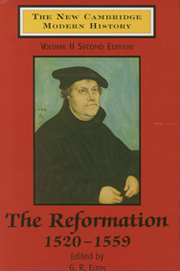Book contents
- Frontmatter
- Introduction to the second edition
- Chapter I The age of the Reformation
- Chapter II Economic change
- Chapter III The reformation movements in Germany
- Chapter IV The Reformation in Zurich, Strassburg and Geneva
- Chapter V The Anabaptists and the sects
- Chapter VI The Reformation in Scandinavia and the Baltic
- Chapter VII Politics and the institutionalisation of reform in Germany
- Chapter VIII Poland, Bohemia and Hungary
- Chapter IX The Reformation in France, 1515–1559
- Chapter X The Reformation in England
- Chapter XI Italy and the papacy
- Chapter XII The new orders
- Chapter XIII The empire of Charles V in Europe
- Chapter XIV The Habsburg–Valois wars
- Chapter XV Intellectual tendencies
- Chapter XVI Schools and universities
- Chapter XVII Constitutional development and political thought in western Europe
- Chapter XVIII Constitutional development and political thought in the Holy Roman Empire
- Chapter XIX Constitutional development and political thought in eastern Europe
- Chapter XX Armies, navies and the art of war
- Chapter XXI The Ottoman empire 1520–1566
- Chapter XXII Russia, 1462–1584
- Chapter XXIII The New World, 1521–1580
- Chapter XXIV Europe and the East
- Index
- References
Chapter XI - Italy and the papacy
Published online by Cambridge University Press: 28 March 2008
- Frontmatter
- Introduction to the second edition
- Chapter I The age of the Reformation
- Chapter II Economic change
- Chapter III The reformation movements in Germany
- Chapter IV The Reformation in Zurich, Strassburg and Geneva
- Chapter V The Anabaptists and the sects
- Chapter VI The Reformation in Scandinavia and the Baltic
- Chapter VII Politics and the institutionalisation of reform in Germany
- Chapter VIII Poland, Bohemia and Hungary
- Chapter IX The Reformation in France, 1515–1559
- Chapter X The Reformation in England
- Chapter XI Italy and the papacy
- Chapter XII The new orders
- Chapter XIII The empire of Charles V in Europe
- Chapter XIV The Habsburg–Valois wars
- Chapter XV Intellectual tendencies
- Chapter XVI Schools and universities
- Chapter XVII Constitutional development and political thought in western Europe
- Chapter XVIII Constitutional development and political thought in the Holy Roman Empire
- Chapter XIX Constitutional development and political thought in eastern Europe
- Chapter XX Armies, navies and the art of war
- Chapter XXI The Ottoman empire 1520–1566
- Chapter XXII Russia, 1462–1584
- Chapter XXIII The New World, 1521–1580
- Chapter XXIV Europe and the East
- Index
- References
Summary
In the states of the Italian peninsula, as in the rest of central and western Europe, the news of the activities and doctrines of Luther, followed by those of Zwingli and later by those of the Anabaptists, the Anti-Trinitarians and Calvin, fell on ground ready to receive it. Among the numerous ecclesiastics, memories of Savonarola’s preaching were not always propitious; thus the best-known Italian translator of Holy Scripture along Lutheran lines, the Florentine Antonio Brucioli, was violently hostile to Savonarola. But there were the hopes raised by the Fifth Lateran Council (1512–17) especially in certain Florentine and allied circles in contact with the Venetian patrician and Camaldolese hermit, Blessed Paolo Giustiniani (1476–1528); there was a desire for greater morality and austerity of life in the laity, the hierarchy and the curia; people were fully aware of the ‘abuses’ originally devised to meet the needs (in money and staff) of the financial administration and the centralised policy of the church, not just the needs of the Holy See as an Italian state in matters of politics and war. There was also a strong desire for a more spiritual conception of Catholic religious life: for men like Giustiniani (and his friends included Gasparo Contarini, a Venetian nobleman, later to become famous as a cardinal) the consequence of such an infusion of the spirit occupied pride of place. These leanings were not in any way meant to affect the spheres of dogma, liturgy, discipline, traditions, the fundamental structure of the church, or the papal authority, but would, it was hoped, be capable of supplying these with energy enough to purify the church ‘in capite et in membris’.
- Type
- Chapter
- Information
- The New Cambridge Modern History , pp. 288 - 312Publisher: Cambridge University PressPrint publication year: 1990



